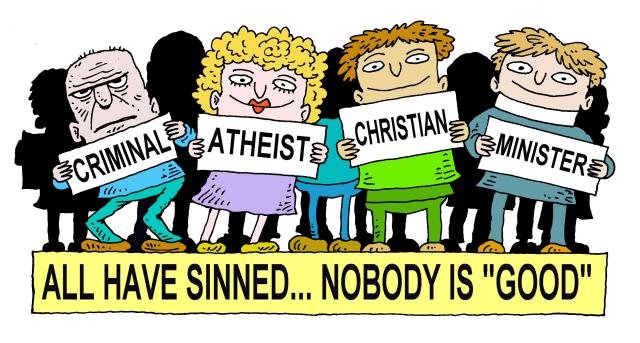
Over the weekend, I received the following email from an Evangelical man named Nathan Tucker. My response is indented and italicized. Tucker read two posts, Another Evangelical Con Job, This Time by 7 Hills Church in Cincinnati, Ohio and Dear Evangelical before contacting me. According to the server logs, he also looked at the front page, which contains ten full-text posts. I do not know what posts he actually read. Tucker read none of my autobiographical material (please see the WHY? page), yet, as you shall see below, he felt qualified to deconstruct my life. Perhaps Tucker missed this verse in his Bible: Answering before listening is both stupid and rude (Proverbs 18:13).
Now to Tucker’s verbose email:
Every single human being has ulterior motives behind all human behaviors. It has been said, and I believe it is true that, the greatest and most basic drive on earth is the human belly. Everything mankind does in the material world, he does so that he can eat and drink, so that he can continue eating and drinking; so he can continue living. Jesus recognizes this in a passage I am sure you are quite familiar with. In Matthew 4:4, Jesus indicates that, “man cannot live by bread alone, but by every word that proceeds from the mouth of God” (The New King James Version, 1979). Jesus, Who was acutely aware of the need to eat after having not eaten in forty days, implicitly states man must have bread to live. That is, man must live on the material things of this world. Yet man cannot live on those material things alone—there must be more to this life than eating and drinking. God tells us that to truly understand what it means to live, one must be “born again” (John 3:3-8).
Tucker claims that “every single human being has ulterior motives behind all human behaviors,” yet provides no evidence for his claim. It is never wise to claim to know something about every human being. Of course, this is a common Evangelical behavior. Everyone is a sinner. Everyone needs to be saved. Everyone will go to Heaven or Hell after they die. The problem with this sort of linear, black-and-white thinking is that billions of people reject it. I am an atheist. I don’t believe in the existence of deities, including the countless Gods Christians worship. I don’t believe the Bible is inspired, inerrant, and infallible. I reject the central claims of Christianity; that Jesus was divine, born of a virgin, lived a sinless life, performed miracles, resurrected from the dead, and ascended into Heaven. Simply put, these things don’t make sense to me. (Please see The Michael Mock Rule: It Just Doesn’t Make Sense.)
Tucker claims, without evidence, that there is more to life than eating and drinking; that what everyone needs is Jesus, the bread of life. What I want to know is this: is Jesus white bread, cracked wheat, rye, or whole grain? If Tucker has evidence for there being anything other than the material world we live in, I would love to see it. So far, all Tucker has done is quote Bible verses and make unsubstantiated claims. If someone claims that there is a spiritual dimension, then they are going to have to cough up evidence to support their claim. Countless Evangelicals have emailed me and left comments on this blog that emphatically said that God/Jesus/Holy Spirit is real. When pressed for evidence for their claims they typically do three things: quote Bible verses, give some sort of subjective, anecdotal testimony of having a saving/personal relationship with Jesus, or flee to safety of the house of faith. Neither of these things can, nor ever will, be sufficient evidence for their claims.
Bruce: I am a wizard! I have the power to do all sorts of supernatural things!
Tucker: No, you are not.
Bruce: Yes, I am!
Tucker: Prove it.
Bruce: I have read all the Harry Potter books. I watched all the movies too. I believe Harry is the one true Grand Wizard. When I embraced Harry as the Grand Wizard, he came into my heart, giving me power to do mighty works in his name. I know, I know, there’s no doubt about it, Harry lives in my heart.
Tucker: I don’t believe you. Until you provide evidence for your claims, I refuse to believe you are a miracle-working wizard.
Until the Tuckers of the world can provide empirical evidence for their claims, I have no reason to believe what they say.
The problem is simply this: many professing American Christians and pastors are not truly born again. Well, how can I say this? Isn’t this a terribly judgmental statement? It is a judgmental statement, but it is a statement based upon the perfect Law of Liberty—Christ says, “You will know them by their fruits” (Matthew 7:15-16, 20). Many times people hear this statement, and they immediately think of the fruits of the Spirit, and I guess that is acceptable. Yet, there is a more basic understanding regarding what it means to be born again, what it means to be a true Christian. Primarily, a true Christian is one who sincerely loves and fears the Triune God and is one who strives to keep God’s Law in thought, word, and deed (Isaiah 66:2; John 14:21; Matthew 22:36-40). Being a Christian means one loves God and loves his neighbor—love is the fulfillment of the Law of God (Romans 13:10).
I would have, as a pastor, agreed with everything Tucker wrote above. I loved and feared God. I strove to keep the law of God in thought, word, and deed. I kept the two great commandments: love God and love my neighbor. Tucker will search in vain for anyone who knew me who would say that I was not a committed Christian. So, I am not sure what point Tucker is trying to make.
Hypocrisy is real. Every single human being is a hypocrite; we only differ in degrees. I am a hypocrite. I know what is right and many times, I find myself doing what I know to be wrong, sometimes uncontrollably so. Many times, I feel like a failure as a Christian. Yet, I know that I am not alone because Paul had this same experience, and he describes it quite succinctly in Romans 7:13:25. Paul is describing the spiritual warfare that goes on within the heart of one who is born again. This warfare or struggle with sin is what characterizes and marks the life of a true Christian—the true Christian seeks to execute or put to death the rebellion towards God in his own heart and life (Colossians 3:5; Romans 8:13), and he seeks to aid others in that pursuit through loving admonition, encouragement, and sincerity of heart, by the power of the Holy Spirit, with the full knowledge that none of this striving can be accredited to man, but all to the grace of God in the sacrifice of Christ.
Hypocrisy is ugly, especially within the church. I hate it in myself, and I hate it in the church. I simply want to vomit when I hear a Baptist or Pentecostal preacher condemn one to hell for partaking in beer or alcoholic beverages, all the while knowing that same preacher is going to have fifteen plates of food from the buffet after the sermon. Equally, that same pastor will no doubt condemn adultery, but adultery and gluttony have at their core the same sin—lust.
Hypocrisy is real, hypocrisy is ugly, but hypocrisy is present everywhere, not just in the evangelical community. For instance, we want freedom of speech to exist in a culture fixated on cancelling the politically incorrect. We want to conserve energy and planetary resources, but we burn countless units of energy for sporting events, entertainment venues, and sometimes, for no purpose at all other than to make something pretty. We want to put an extreme and almost obsessive focus on health, but not help the truly sick and suffering because of the “evil of opioids” and potential drug addiction.
Okay? So what . . . I am an atheist, so all this verbiage has no relevant meaning to me, outside of the fact that we all can be, at times, hypocrites. I don’t need a relationship with Jesus to know I am a hypocrite, nor do I need the Holy Spirit to convict me of my hypocrisy. I am quite self-aware. Even my counselor agrees with this assessment. (In fact, she thinks I am too self-aware.) Thus, I am cognizant of when I am being hypocritical. The difference between myself and Evangelicals is that I am not morally hypocritical. I don’t get up in a pulpit on Sundays and preach about all sorts of “sins” and then go home and commit the very sins I preached against. I don’t wage war against society’s vices and sexual proclivities all the while practicing these very same sins in the privacy of my home or a motel room.
Additionally, Atheists and Humanists are not spared from hypocrisy. They lament the evils of the world such as hypocrisy, justifiably so, but due to the nature of their worldview, one that hinges on the idea that there are no moral absolutes, they cannot sincerely call hypocrisy evil. Hypocrisy is distasteful to be sure, but hypocrisy, murder, sexual impurity, and deceit cannot be called evil, not if the atheistic humanist is to remain true to his worldview, that is.
I love it when an Evangelical zealot tells me what it is I believe or what other atheists believe. Personally, I think morality is inherently subjective. Christians believe the same thing. If that weren’t so, then the followers of Jesus would all have the same moral beliefs. Since no two Christian believe the same things about morality, it is clear, at least to me, that morality is subjective for Christians too.
I am a humanist. It is humanism, not atheism, that provides a moral framework by which I live my life. Please read the Humanist Manifesto to learn more about how humanists view morality. As far as “evil” is concerned, evil is not a thing or an entity separate from human behavior. Evil does not exist apart from humans. Humans do evil things. I have no problem saying that certain behaviors are evil.
That is where this discussion comes full circle, Bruce. You claim to be an atheist and a humanist, yet you reject the evangelical community because of their failure to adhere to a standard of sincerity that your worldview cannot legitimately define and account for unless moral absolutes exist. If morality is relative and merely rooted in human consensus, societal convention, as the Humanist Manifestos claim, then why shouldn’t the evangelical community be hypocritical if that is what gives them fulfilment, meaning, and happiness? You might say it defies logic to believe one thing and act contrary to that belief, all the while seeking to bring in new acolytes to use and abuse. Again, by what standard is anything “logical” or “illogical” if there is not some absolute standard by which these human abstractions are to be measured?
I do not reject the Evangelical community. I am surrounded by Evangelicals. What I reject are Evangelical beliefs and practices. What I object to is the psychological, and, at times, physical harm caused by Evangelical preachers and churches. (Please see the Black Collar Crime Series — one thousand stories and counting.)
Instead of spending an inordinate amount of time and energy rebutting Tucker’s claims about atheists and morality, I will leave the task to atheist firebrand and expert debater Matt Dillahunty.
For more of Matt’s talks and debates about morality, check out the videos listed on YouTube.
The truth of the matter, Bruce, is you, like me, have been injured by either a wolf in sheep’s clothing inside of the evangelical community, or you may have been injured by a sincere Christian caught up in sin, but the actions of others cannot give us an excuse to reject our Creator and Sustainer. You know God exists and you have spent the last two decades pointing at the hypocrisy of others so that you can explain away His existence.
This is the point in his screed where Tucker shifts into Christian Asshole® mode. Without bothering to read any of my autobiographical material, he is going to tell me why I am not a Christian and what it is I really believe.
Tucker tells me that I was either hurt by a preacher or the sinful actions of Christians. Over the past sixteen years, I have written over 6,000 posts. Not one time have I said that I left Christianity because of someone “hurt” me. Not once. Did Evangelical Christian behavior play a part in my deconversion? Sure, a small part, as did numerous other things. However, I have made it clear over, and over, and over again to the Nathan Tuckers who contact me that I left Christianity for intellectual reasons. Not because I am angry, hurt, or jaded, but because the central claims of Christianity are false. It is really that simple. I am more than happy to discuss these reasons with Evangelicals, but they typically choose to attack my character and motivations instead of meaningfully engaging me on the real reasons I no longer believe. The reason for this is simple. If they say that I divorced Jesus for emotional reasons, they can dismiss my story out of hand. “Oh, Bruce just got his feelings hurt and couldn’t cut it” (as Dr. David Tee frequently says). Evangelical zealots know that if they engage me on the intellectual reasons for my deconversion they are likely to end up looking bad. I know the Bible inside and out. I am an expert on Evangelical Christianity. I am quite fluent in what Evangelicals believe and how they think. How could I not be? I was born into, raised, and educated in Evangelicalism. I spent the first thirty years of my marriage swimming in the deep end of the Evangelical pool. Even today, I continue to stay connected to the Evangelical sect. If Tucker wants to engage me on Evangelical beliefs and practices, I am game. I am ALWAYS game. Sadly, no one wants to play. 🙂
All the while, your actions beg the following question: why does it matter whether people believe in God or are used and abused by the evangelical community or not? If this life is all that matters, why not let people enjoy it how they see fit? Because they are being lied to? By what standard is something a lie or the truth? What are you trying to save them from? What is your motivation?
Evidently, Tucker thinks I should be okay with preachers, churches, and parachurch organizations misusing and abusing people; that I should be okay with preachers raping and sexually molesting children; that I should be okay with Evangelical theocrats trying to take over our government; that I should be okay with Evangelicals trying to ban books and history in public schools; that I should be okay with Evangelical racism, bigotry, and homophobia.
It is because we only have one life that these things matter. I have a wife I have been married to for almost forty-five years. I have six adult children. I have thirteen grandchildren. I have at least twenty reasons to work as hard as I can to make this world a better place to live. Jesus, I am starting to think that Tucker hasn’t ever talked to an actual atheist. Most atheists seek meaning and purpose in their lives. We want a better tomorrow, not only for ourselves, but also for everyone.
As you can see, Tucker repeatedly claims that atheists aren’t moral; that they have no moral foundation. He’s convinced that we are immoral, godless heathens. No amount of challenge is going to change his mind. He knows what he knows. Unfortunately, he doesn’t know what he doesn’t know.
Tucker is only moral because of Jesus. If that is the only reason he doesn’t rape, murder, steal, or eat too much at Thanksgiving, by all means, Tucker, for the sake of all of us, stay saved. We don’t want you going on a crime rampage, all because you don’t have the Holy Spirit living in your mythical heart.
Now, you may ask, what is my motivation behind writing you? Sincerely, I do not know what my motivation is at this point. I was looking into this band called 7 Hills Worship and your website popped up. I know that I am not trying to save you; God alone can deal with the heart and conscience of human beings, and salvation is up to God, not man (Romans 9:10-24). I am not trying to fight because of some sense of pride. I am not trying get money or fame (I am convinced I will never have either; that is okay). Heck, I am not even trying to befriend you. I think what struck my conscience is your pain. I have experienced similar pain and I wanted to set my faith aside too.
No, Tucker hasn’t. He doesn’t personally know me, nor does he know anything about me. He was too lazy to invest any time in reading my autobiographical writing. Yet, he knows my “pain.” Fuck off with that nonsense. Yes, I have experienced a lot of trauma in my life, more than most people experience. Yes, I battle serious, unrelenting physical pain every day of my life. Tucker could have known these things had he shown a bit of curiosity, but unfortunately, curiosity is not a common Evangelical trait. (Please see Curiosity, A Missing Evangelical Trait.)
Tucker is being less than honest when he says he doesn’t know what his motivations are for writing me. I have heard from thousands of zealots over the years. Typically, they respond to me because they think God want them to do so or they “feel” the need to set me straight or they delusionally think that they will be the one who brings me back to the faith. Tucker read the Dear Evangelical post. In this post was all the information necessary to know who and what I am. I even give Evangelicals a Reason for Contact Check List they can use when emailing me:
Reason for Contacting Bruce Gerencser (Check all that apply)
_____To tell him he is wrong
_____To preach at him
_____To quote Bible verses to him
_____To evangelize him
_____To tell him he doesn’t know anything about the Bible
_____To let him know God still loves him
_____To let him know I am praying for him
_____To tell him he never was a Christian
_____To tell him he is going to Hell
_____To tell him he is still saved and can never be un-saved
_____To tell him he was/is a false prophet
_____To tell him he was/is a wolf in sheep’s clothing
_____To tell him he is angry
_____To tell him he is bitter
_____To tell him his writing shows he has been hurt
_____To tell him he is fat
_____To tell him I hope he burns in Hell
_____To tell him that I am praying God will kill him
_____To tell him that he has a meaningless, empty life
_____To tell him he is going to die soon and then he will find out THE TRUTH!
_____To tell him that I know THE TRUTH about him!
Once you have completed the form, cut and paste it into your email or comment.
Tucker could have saved himself a lot of time by using this checklist. Instead, he sent me a sermon. I will leave it readers to “discern” his motivations.
Yet, the hypocritical behavior of others cannot change the truth that nothing in this world makes sense apart from the Christian worldview, the Christian faith—not the Christians who hold that view, but the objective truth of Christianity itself. Biblical Christianity is true, despite the shortcomings of its practitioners. In fact, Jesus even warned us about these people, which brings even more veracity to His claims. The fact is that Christ is the only perfect man to ever live—He is the only human being that cannot be charged with hypocrisy; that is why He was murdered and that is why our trust must solely rest in Him, not His followers. Take care.
My worldview makes perfect sense, all without God, Jesus, Christianity, and the Protestant Christian Bible. Most people in the world believe the same thing. Yet, Tucker is convinced that his little band of true believers has cornered the market on truth; that their worldview is the only one that makes sense. We see similar thinking among Trumpists, QAnon supporters, anti-vaxxers, and conspiracy theorists. It is not surprising that many of these people are also Evangelicals. The dominant religion of those who tried to overthrow the U.S. Government on January 6, 2021? Evangelical Christianity.
Christianity does not equal objective truth. I am more than happy to school Tucker on the falsity of his claim. While we are at it, we can discuss why the Evangelical deity is immoral and why the Bible shouldn’t be used for anything other than a paperweight.
What is “Bible Christianity”? No two Evangelicals agree on its definition. The Bible isn’t inerrant or infallible, nor is it internally consistent. Contradictions abound. That said, if Evangelicals want to believe that the Bible is true, fine. Just keep your nose out of my business. I don’t care what the Bible says, nor do care what Evangelicals think about how I live my life. You do you and I will do me. And if my wife consents, we can do each other. 🙂
Jesus was a man. He lived and died, end of story. Just because a religious text says Jesus was _________ doesn’t make it so. I have no reason to believe that Jesus was anything other than a Jewish apocalyptic preacher who ran afoul of Jewish leadership and Roman law and got himself killed.
Tucker really needs to rethink why Jesus was executed. That’s some bad theology. Maybe if he decides to engage me we can talk about his claims about Jesus.
Saved by Reason and Polly’s Awesome Cooking,

Bruce Gerencser, 66, lives in rural Northwest Ohio with his wife of 45 years. He and his wife have six grown children and thirteen grandchildren. Bruce pastored Evangelical churches for twenty-five years in Ohio, Texas, and Michigan. Bruce left the ministry in 2005, and in 2008 he left Christianity. Bruce is now a humanist and an atheist.
Connect with me on social media:
Your comments are welcome and appreciated. All first-time comments are moderated. Please read the commenting rules before commenting.
You can email Bruce via the Contact Form.


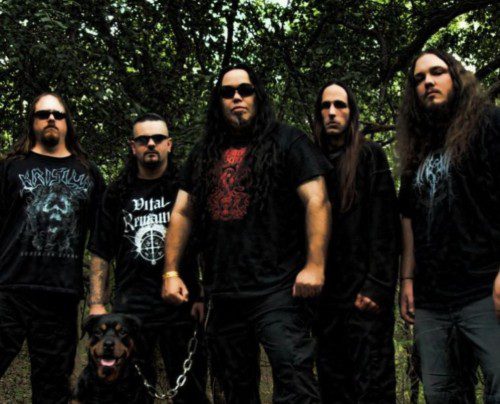
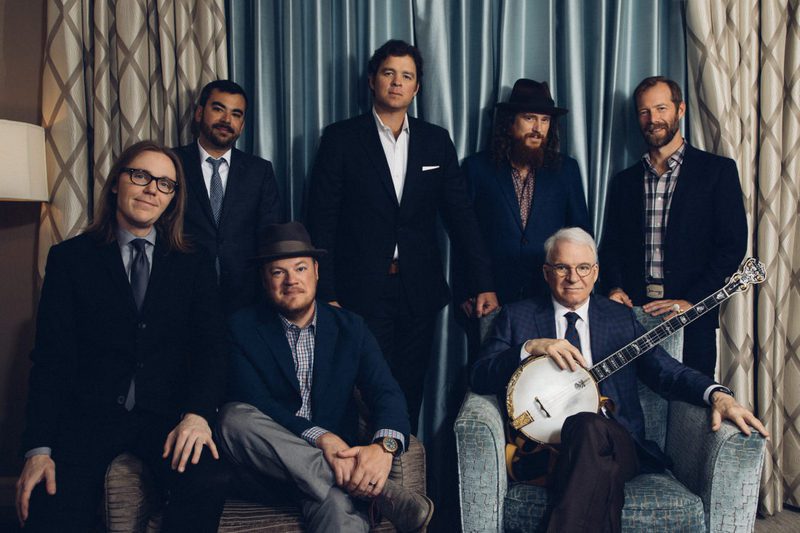


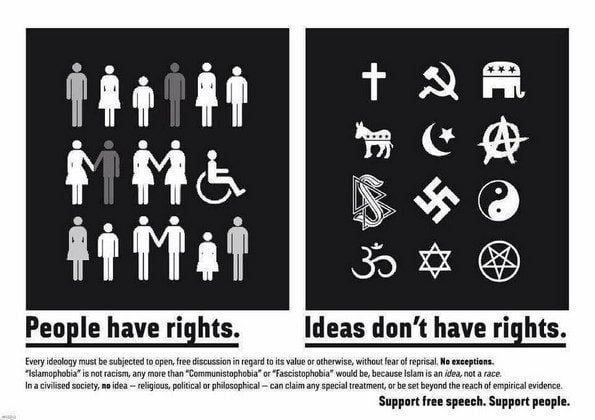

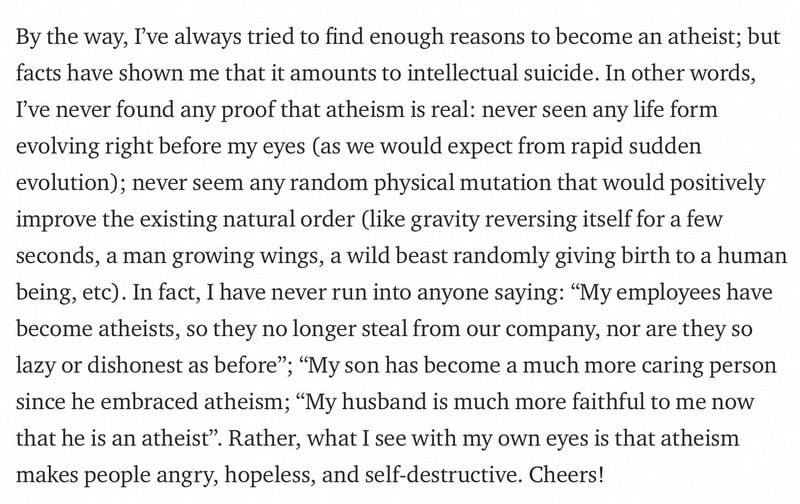 A
A